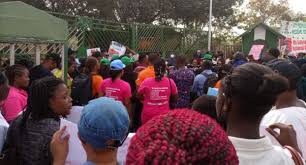Maureen Okpe
The Civil Society Legislative Advocacy Centre (CISLAC) has condemned the National Assembly for refusing to assent to the 35% affirmation bill set at reducing marginalisation of women political participation,and minimise discrimination during it’s constitutional review.
in celebrating International Women’s Day, its Executive Director, Auwal Ibrahim Musa Rafsanjani, commended Nigerian women who are still making positive contribution towards Socio-Economic and political development in Nigeria, despite the hardship.
Rafsanjani noted that despite the support during the public hearing the Ahmed Lawal led National Assembly deprived women the opportunity to be mainstreamed into socio-economic and political development in Nigeria.
He also decried the poor outcome of INEC BVAS and IReV, stating,” the outcome of the recently concluded National Assembly elections which was meant to utilize technological innovation, across the country was a huge.
I’m in
“Out of the Seven female serving Senators in the 9th Assembly, the result announced by INEC so far indicates that none of the female senators will be returning, and only 3 new female senators have been announced so far.”
The Executive Director further charged government at all levels to implement strategies with potential of reducing financial hardships caused by climate shocks with result to school dropouts of girls, child marriages, teenage pregnancies, and sexual trafficking of girls and women.
The organisation demanded government to fully implement the Safe School Initiative to guarantee the safety of school children, especially for girl children.
It also demanded relevant authorities to provide the enabling platforms for reporting cases of all forms of sextortion and prosecute reported cases, while calling for the adoption and implementation of the Violence Against Persons (Prohibition) Act of 2015.
It also demanded that the dysfunctional and poor access to health care for women which leads to maternal mortality and malnutrition be remedied.
CISLAC noted with serious concerns the situation across some states where women were targeted in electoral conflict, physical and virtual intimidation, as well as harassment in the cause of discharging their civic duties. This is despite the support they provide to political parties and governance in Nigeria.
CISLAC noted that from the earliest days of computing to the present age of virtual reality and artificial intelligence, women have made untold contributions to the digital world in which we live.
“Women’s accomplishments have been against all odds, in a field that has historically neither welcomed nor appreciated them. Unfortunately, Women make up only 22 per cent of Artificial Intelligence workers globally. A global analysis of 133 Artificial Intelligence (AI) systems across industries found that 44.2 per cent demonstrate gender bias.
“In Nigeria, the National Bureau of Statistics (NBS) data shows that women on the average make up only 22 per cent of the total number of engineering and Technology University graduates on yearly basis, even though the IT industry often talks about inclusion and diversity, much more work needs be done with respect to technological innovation for gender equality in Nigeria
“Today, a continuous gender gap in digital accessibility keeps women from realizing technology’s full potential. This is largely due to underrepresentation in Science, Technology, Engineering and Mathematics (STEM) education and careers which form a major barrier to their participation in tech design and governance which is not unconnected to sextortion in institutions of learning and workplaces.
“The dominant threat of online gender-based violence coupled with a lack of legal recourse too often forces them out of the digital spaces they do occupy.
“Amidst all odds, digital technology is opening new doors for the global empowerment of women, girls, and other marginalized groups.
“Nigeria, however, is not utilizing the opportunities that these innovations provide. From gender-responsive digital learning to tech-facilitated sexual and reproductive healthcare, the digital age represents an unprecedented opportunity to eliminate all forms of disparity and inequality.
“CISLAC is by this opportunity of this year’s commemoration of women’s day call on governments, corporate entities and to double their efforts to make the digital world safer, more inclusive and equitable. Facing a multiplicity of global crises, we have a chance to create a better future, not just for women and girls, but for all humanity on Earth.
.

